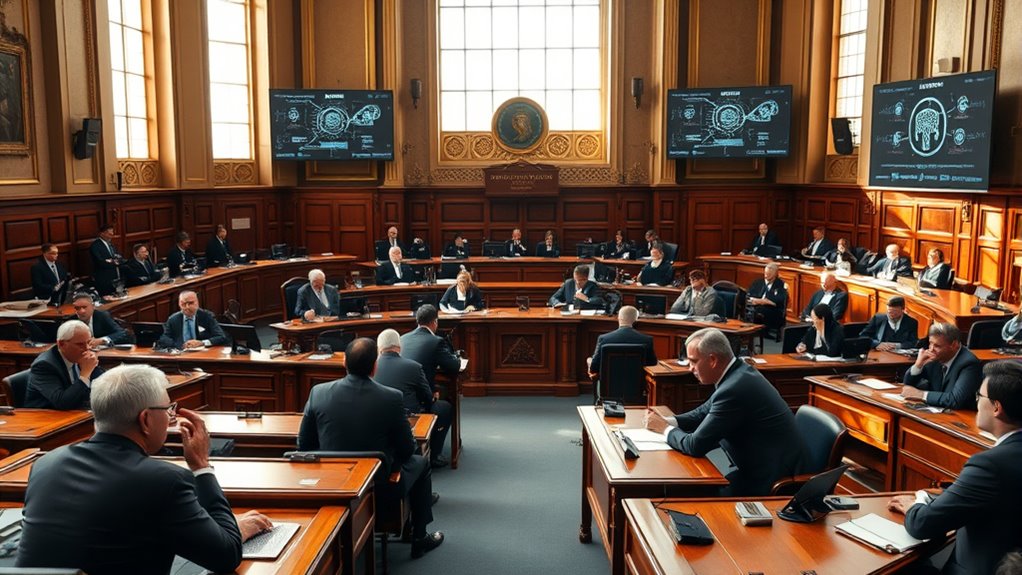In Chile, the politics of AI show that progress often involves tough trade-offs between innovation, ethics, and security. The government has introduced groundbreaking laws inspired by the EU, balancing regulation with fostering growth. However, challenges like unclear liability rules and cybersecurity risks highlight that advancing AI isn’t straightforward. Understanding how Chile navigates these issues reveals why achieving responsible AI progress is rarely easy, and you’ll discover more behind these complex debates if you keep exploring.
Key Takeaways
- Chile’s pioneering AI legislation balances innovation with safety, illustrating the complex trade-offs in AI policy development.
- Stakeholder engagement and ethical standards often slow progress, reflecting political and social debates around AI regulation.
- Security and liability challenges reveal how technological advances are hindered by underdeveloped legal frameworks.
- Heavy infrastructure investments demonstrate ambition but also highlight difficulties in managing rapid AI growth responsibly.
- Political tensions and evolving regulations show that advancing AI requires navigating complex compromises and resistance.

Chile is rapidly shaping its AI landscape by implementing pioneering policies that balance innovation with ethical considerations. You can see this through the country’s introduction of a groundbreaking AI Bill in May 2024, making it one of the first in Latin America to adopt a risk-based regulatory framework inspired by the EU AI Act. This legislation aims to regulate AI system design, deployment, and use to protect health, safety, and fundamental rights while embedding universal ethical principles. As you follow the process, you’ll notice key elements like the creation of an AI Commission, a national AI registry, and pre-authorization requirements for high-risk AI applications. Certain uses, such as broad biometric IDs in public spaces, are explicitly prohibited. The Bill’s progress is remarkable: it passed the Chamber of Deputies in August 2025 and is now under further review involving diverse stakeholders, including the public, private sector, academia, and civil society. This process highlights the political balancing act—striving for innovation without sacrificing safety or ethics. Transparency, human oversight, thorough documentation, and risk assessments are now mandated for public agencies and businesses, reflecting the government’s commitment to responsible AI deployment. Chile’s legal framework for AI liability remains underdeveloped, raising concerns about responsibility for harms caused by AI systems. Moreover, the ongoing cybersecurity challenges, such as recent cybersecurity incidents, underscore the importance of integrating security measures into AI policies. At the same time, Chile’s broader AI strategy reinforces this cautious yet ambitious approach. The 2021–2030 National AI Policy, led by the Ministry of Science, Technology, Knowledge and Innovation, sets three strategic pillars: enabling factors, development and adoption, and ethics and regulation. This policy aligns with UNESCO’s recommendations, emphasizing responsible, ethical AI use that fosters sustainable growth. It also includes government pilot programs to modernize services, re-skill workers, and protect citizens, all while pushing for compliance with stricter procurement and liability standards. Chile has invested heavily in AI infrastructure, ranking first in Latin America on the ILIA 2024 index. The country now operates around 58 data centers, with plans for US$2.5 billion investments and 28 new facilities to boost capacity. These investments strengthen data sovereignty, reduce latency, and support government AI initiatives on domestic infrastructure. Funding for AI research totals about US$116 million over the next decade, fostering innovation and responsible deployment. Yet, amid these advancements, there’s ongoing debate about the risks and rewards of AI regulation. Some stakeholders see regulation as a catalyst for growth, while others worry it could hinder progress. Chile’s journey illustrates that progress in AI often comes with no easy victories, especially when balancing technological innovation with ethical responsibilities.
Frequently Asked Questions
How Does Chile Compare to Other Latin American Countries in AI Policy?
You’ll find Chile leads Latin America in AI policy, thanks to its thorough legislation, early public sector integration, and strong infrastructure investments. Unlike Brazil, Argentina, or Colombia, Chile’s AI Bill surpasses regional efforts with strict regulations, oversight, and international alignment. Its proactive approach in reskilling officials and building data centers positions it as a regional frontrunner, fostering responsible innovation and economic growth, even amid enforcement challenges.
What Role Do International Organizations Play in Chile’s AI Development?
Imagine having a secret weapon like the internet in 1990 — that’s how international organizations shape Chile’s AI development. They provide crucial partnerships, benchmark data, and global standards, guiding responsible innovation. They help Chile align its policies with international ethics, support regional cooperation, and build local expertise. This essential influence accelerates progress, ensures transparency, and fosters sustainable growth, proving that global collaboration is key to overcoming local challenges in AI.
How Is AI Impacting Chilean Education and Workforce Training Programs?
AI is transforming Chilean education and workforce training by automating administrative tasks, personalizing learning, and enhancing skill development. You’ll see more programs teaching AI literacy, ethical use, and technical skills to prepare students and workers for digital futures. Government initiatives, partnerships, and university courses are actively upskilling educators and the workforce, making them more adaptable, productive, and aligned with global AI trends, ensuring Chile stays competitive in the evolving digital economy.
What Ethical Concerns Are Most Prominent in Chile’s AI Policies?
You should be aware that Chile’s AI policies prioritize ethical concerns like protecting fundamental rights, ensuring transparency, and preventing manipulation. They prohibit AI systems with unacceptable risks, such as deepfakes or biometric data misuse, without user consent. Transparency mandates require clear disclosures, and ethical governance emphasizes responsible public sector AI use. These measures aim to balance innovation with safeguarding privacy, fairness, and human rights, reflecting Chile’s commitment to ethical AI development.
How Do Chilean Citizens Perceive Government Efforts on AI Regulation?
You might think Chileans see government efforts on AI regulation as flawless, but many remain cautiously optimistic. They appreciate the transparency and inclusivity, yet worry about whether regulations can keep pace with rapid tech advances. While they trust in Chile’s leadership and expect laws to protect rights without stifling innovation, skepticism persists about enforcement and actual impact, reminding you that progress always has its hurdles, even when well-intentioned.
Conclusion
You see, Chile’s journey with AI politics highlights that real progress rarely comes with quick wins. Despite challenges, the country has managed to implement policies that boosted AI research by 30% in just two years. This shows that careful, persistent effort pays off, even when victories aren’t immediate. So, if you’re looking for lessons in steering through complex tech policies, Chile’s experience reminds you to stay resilient and patient—because meaningful change takes time.










